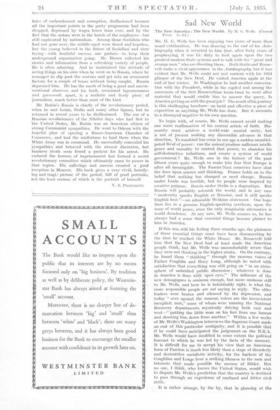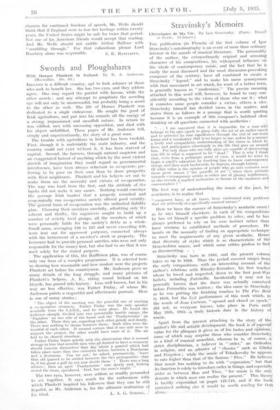Sad New World Mn. H. G. Wells has been enjoying
two years of more Than usual exhilaration. He was thawing to the end of his Auto- biography when it occurred to him that, after forty years of prophesying, it was hi a duty to look again upon the two greatest modern State systems and to talk with the " great and strange men " Who are directing them. Both Stalin and Roose- velt make a vivid appearance in the Autobiography, but it was evident that Mr. Wells could not rest content with his 1934 glimpse of the New Deal. He visited America again at the end of last winter. In Washington he had another conversa- tion with the President, while in the capitol and among the successors of the first Rooseveltian brain-trust he went after material that would enable him to answer the query, Is America getting on with the greatjob ? The result of his journey is this challenging brochure—as lucid and effective a piece of exposition as anything Mr. Wells has done. But it amounts to a dismayed negative to his own question.
To begin With, of course, Mr. Wells cannot avoid making one more reaffirmation of his central article of faith. :Hu- manity must • achieve a world-wide mental unity, but is not at present making any discernible advance in that direction. To mankind has come in our age a sudden unantici- pated flobd of power: can the animal produce sufficient intelli- gence and morality to control that power, to abandon his self-destructive tribalisms, and create a system of world government ? Mr. Wells sees in the history of the past fifteen years quite enough to make him fear that Europe is after all incorrigible. The Fascist-Nazi countries have shut the door upon science and thinking. France holds on to the belief that nothing has changed or need change. Russia under Lenin was terrible, but its people were inspired by creative purpose. Russia under Stalin is a dogmativa. But Russia will probably astonish the world, and in any case " modernity speaks English or Russian, and it still speaks English best "—an admirable Wellsian statement. Our hope then lies in a genuine English-speaking synthesis, upon the issue of world peace, since the. only imaginable alternative is world decadence. At any rate, Mr. Wells assures us, he has always had a sense that essential things become plainer to him in America.
If this was still his feeling three months ago, the plainness of those essential things must have been disconcerting by the time he reached the White House, Mr. Roosevelt tpld
• him that the New Deal had at least made the Ameriean people think, but Mr. Wells was uncomfortably aware that they were not thinking in the higher strata. On the contrary, he found them ." thinking " through the raucous voices of Father Coughlin and Huey Long, although he noted ith satisfaction that everything was still going on " in an atmo- sphere of unbridled public discussion ; whatever is done in America is done with open eyes." The influence of the new demagogues is ominous enough, but more ominous still to Mr. 'Wells, and here he is indubitably right, is what the more responsible people are not saying in reply. The older leaders were beaten and silenced by the depression, and today " over against the raucous voices are the inconsistent inexplicit men," some of whom were ',inning the National Recovery departments, mystically driving both east and west—" putting the little man on his feet from one bureau and shooting him down from another." Within a few weeks of Mr. Wells's Washington interviews the Supreme Court made an end of this particular ambiguity, and it is possible that if he could have anticipated the judgement on the N.R.A. Mr. Wells would have modified to some extent the political forecast to which lie was led by the facts of the moment. It is difficult for me to accept his view that an American form of Fascism is Much less likely than a stage of disorderly and destrubtive socialistic activity, for the backers of the Coughlins and Longs bear a striking likeness to the men and interests that made possible the success of Hitler. But no one, I think, who knows the United States, would wish to dispute Mr. Wells's prediction that the country is destined to pass through an experience of confused and bitter civil strife.
It is rather strange, by the by, that in glancing at the
:chances for continued freedom of speech, Mr. ‘VeIls should think that if England were to lose her heritage within twenty years, the United States might be safe for twice that period. Not one of his; merican friends would :accept that reading. And Mr. Wells should not saddle Arthur Balfour with " muddling through." For that calamitous phrase Lord















































 Previous page
Previous page